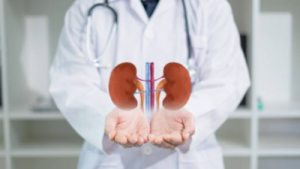ARTICLES
Kidney Damage: How Diabetes, Hypertension, and Other Health Conditions Harm Your Kidneys
Kidney Damage: How Diabetes, Hypertension, and Other Health Conditions Harm Your Kidneys

Your kidneys work silently every day, filtering blood, removing waste, balancing fluids, and regulating blood pressure. Yet, despite their importance, they often don’t get the attention they deserve—until something goes wrong.
Kidney damage doesn’t just happen overnight. It creeps in over time, especially when underlying conditions like diabetes and hypertension are poorly managed. And once kidney function starts to decline, it can spiral into life-threatening complications. Here’s how it happens—and what you can do to protect your kidneys.
What Your Kidneys Really Do
Each kidney, about the size of a fist, contains millions of microscopic filtering units called nephrons. These act like complex sieves, separating waste and excess fluids from your bloodstream while keeping essential substances like proteins and nutrients in.
They also:
- Regulate electrolyte levels
- Maintain blood pressure balance
- Produce hormones for red blood cell production
- Help activate vitamin D for bone health
But when damaged, these functions start to fail—often with little or no early symptoms.
How Diabetes Damages Your Kidneys
Diabetes is the leading cause of chronic kidney disease (CKD) worldwide. When blood sugar levels remain high for extended periods, the tiny blood vessels in the kidneys—called glomeruli—suffer damage. These vessels act as filters, and high sugar essentially erodes them.
This can cause a condition known as proteinuria, where proteins that should stay in the blood leak into the urine. Over time, the kidneys lose their ability to filter waste, leading to:
- Fluid buildup
- Increased blood pressure
- Toxin accumulation in the body
Roughly 1 in 3 adults with diabetes will develop diabetic kidney disease. However, tight blood sugar control, healthy lifestyle choices, and regular screenings can significantly lower the risk.
Hypertension: The Silent Kidney Killer
High blood pressure is another major threat to kidney health—and often goes unnoticed. When blood flows through your kidneys at excessive force over time, it damages the vessels and reduces their ability to filter waste properly.
This creates a harmful cycle: damaged kidneys cause blood pressure to rise further, and elevated pressure continues to harm the kidneys. If left unmanaged, hypertension can lead to irreversible kidney failure.
It’s currently the second most common cause of kidney failure, after diabetes.
Other Common Causes of Kidney Damage
Kidney disease isn’t caused by diabetes and hypertension alone. Several other medical conditions, lifestyle habits, and genetic factors also contribute:
1. Glomerulonephritis
An inflammation of the glomeruli—often triggered by infections, autoimmune conditions, or unknown causes.
2. Polycystic Kidney Disease
A genetic disorder that causes multiple fluid-filled cysts to grow in the kidneys, displacing healthy tissue and impairing function.
3. Recurrent Kidney Infections
Repeated kidney or urinary tract infections can lead to scarring over time, affecting kidney performance.
4. Kidney Stones
While often temporary, large or frequent kidney stones can obstruct urine flow and lead to injury.
5. Medications and Toxic Substances
Long-term use of certain painkillers (like NSAIDs), some antibiotics, contrast dyes used in scans, and specific chemotherapy drugs can all be toxic to the kidneys.
6. Obstructions
Conditions like an enlarged prostate, tumors, or urethral strictures can block the urinary tract, causing pressure buildup and damage.
7. Autoimmune Disorders
Diseases like lupus can cause the immune system to mistakenly attack the kidneys.
8. Genetic Disorders
Rare inherited diseases like Alport syndrome can lead to progressive kidney decline.
9. Other Health Conditions
Obesity, heart failure, metabolic syndrome, and sickle cell disease have all been associated with impaired kidney function.
What Happens When Your Kidneys Stop Working?
When kidneys begin to fail, you might not notice at first. But as the damage progresses:
- Waste builds up in the blood, leading to fatigue, nausea, or confusion
- Fluid retention causes swelling in the legs, ankles, or face
- Blood pressure becomes harder to control
- Bone health deteriorates, increasing the risk of fractures
- Anemia develops due to reduced red blood cell production
- Eventually, dialysis or a kidney transplant may become necessary
Kidney disease is often irreversible. That’s why early detection and preventive care are so important.
How to Protect Your Kidneys
The good news is, most kidney damage can be prevented or slowed down with the right lifestyle choices and medical care. Here’s how to take charge:
Control Blood Sugar
For people with diabetes, consistently managing blood sugar levels is one of the best defenses against kidney damage.
Keep Blood Pressure in Check
- Reduce salt intake
- Exercise regularly
- Maintain a healthy weight
- Take medications as prescribed
Stay Hydrated
Drink water regularly, but don’t force excessive amounts. Balance is key.
Eat Whole Foods
Limit processed foods and fast food high in sodium, preservatives, and unhealthy fats.
Use Medication Wisely
Avoid self-medicating with over-the-counter painkillers like ibuprofen for extended periods. Always consult your doctor about drug side effects, especially if you have existing kidney risks.
Don’t Smoke
Smoking constricts blood vessels and accelerates kidney decline, especially in people with high blood pressure or diabetes.
Get Regular Health Checks
Annual screenings for kidney function, especially if you have diabetes, hypertension, or a family history of kidney issues, can detect problems early—when they’re still manageable.
Discover more from 9jaPolyTv
Subscribe to get the latest posts sent to your email.

 ARTICLES22 hours ago
ARTICLES22 hours agoConfirmed Loan Apps That Give ₦50,000 Instantly in Nigeria

 ARTICLES22 hours ago
ARTICLES22 hours agoOkash Loan Interest Rate on ₦500,000 and ₦1,000,000 Loan (Calculation)

 EDUCATION5 hours ago
EDUCATION5 hours agoNYSC Approves Mobilization for Part-Time ND, Full-Time HND Graduates — Registration Guide, Jobs, Scholarships and Next Steps

 ARTICLES22 hours ago
ARTICLES22 hours agoBest Loan Apps for Instant ₦10,000 in Nigeria Without Collateral

 ARTICLES22 hours ago
ARTICLES22 hours agoCBN Approved Loan Apps in Nigeria: Full List of Licensed and Trusted Platforms

 ARTICLES22 hours ago
ARTICLES22 hours agoTop Loan Apps That Don’t Require BVN in Nigeria

 ARTICLES22 hours ago
ARTICLES22 hours agoTop Loan Apps in Nigeria Without Face Verification

 ARTICLES22 hours ago
ARTICLES22 hours agoMoniepoint Loan App: Everything You Need to Know




































